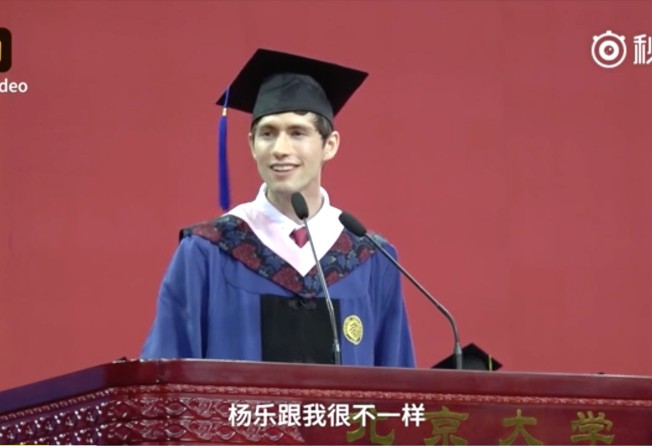US student slams Donald Trump to loud applause at Peking University graduation speech

An American student studying in the prestigious Peking University criticised US President Donald Trump in his graduation speech last week, comparing his state leader to China’s first emperor Qin Shi Huang.
Cody Abbey’s speech won him resounding applause from thousands of students and educators at his graduation ceremony last Wednesday, according to a video that went viral on Chinese social media this week.
“The new president of my country likes China in part because he admires China’s Great Wall,” Abbey, a graduate student in China studies, said in fluent Mandarin.
“This is not because the Great Wall is a cultural heritage, but he wants to be like Emperor Qin Shi Huang and build a barrier separating people from those outside.”
The remarks in Abbey’s 12-minute speech were followed by loud claps and cheers from the crowd that went on for almost 20 seconds.
Emperor Qin Shi Huang was the first monarch of a unified China, formed in 221BC. The tyrannical ruler is most well known for ordering the building of the Great Wall, the burning of books and the burying of Confucius scholars alive in a massive pit.
His empire collapsed immediately after his death in 210BC due to massive uprisings.
Trump has proposed building a wall to stop illegal immigrants from Mexico into the United States through their shared border. He has said that the project would be “peanuts” compared with the Great Wall of China.
Abbey was studying at Peking University’s Yenching Academy, an interdisciplinary master’s programme that takes in more than 20 participants from around the world each year to study China-related issues.
While Abbey’s speech received mostly positive feedback on Chinese social media, some internet users raised concerns that his critical comments of Trump could get him into trouble with his fellow Americans.

“I don’t know whether the Americans will brand him a traitor after watching the speech,” Sina Weibo user XiaoxiaoxiaoMJ wrote.
Another Weibo user, Jiangqiqiyoubao, wrote: “Trump may cry. Will this young man be able to go back to the US?”
Others were not so worried about the American reception to Abbey’s speech.
“It’s nothing. American celebrities humiliate their president on television every day,” wrote Yilianmeirenzhiyizuixiaohuya.
YangwenAI agreed: “They have very good democracy. They have freedom of speech, unlike in our country, if you say something [negative about China] in public, the consequences will be…”
In May, overseas Chinese student Yang Shuping delivered a graduation speech in the University of Maryland, criticising China’s air pollution problems.
Her speech sparked a huge backlash at home with some state media outlets and internet users lambasting her for betraying the motherland.
Read Abbey’s full speech here:
Dear faculty, classmates, and guests:
Good morning!
In the past, in the United States, I’ve studied Confucianism. From it, the teaching “the superior man strives for harmony despite differences with others” left me with a deep impression. These past two years, this principle of “different but harmonious” defined my growth process at Peking University, and it will continue to guide me for the rest of my life.
Now, I’ll use three stories to explain why this is.
The first story taught me the first aspect of “different but harmonious”: getting to know others.
In May of last year, my department organized a field research trip to Ningxia. Altogether, there were 21 Yenching Academy students who went, including twelve female students and nine male students. The lodging arrangements were that there would be two students to each hotel room. Now, although I come from a country that has performed among the worst on the PISA test’s math section, at that time I was able to calculate that this meant that one male student would not be living with another Yenching Academy classmate. That male student ended up being me. After looking at the name list, I discovered that my roommate would be a PhD student in the sociology department named Yang Le. He would be the teaching assistant on our trip.
Very quickly, I noticed that Yang Le was quite different from me, and even quite different from many Chinese people I knew. On the very first morning, upon getting out of bed I found Yang Le positioned in a squat, his back against the wall, and both of his eyes closed. Here, I’ll demonstrate it for you. [Demonstrates squat.] He told me that this posture is called “the beggar’s squat” and that it was a way that beggars in ancient times would digest and exercise after eating. Yang Le taught me how to hold this posture, but after ten minutes I discovered that beggars in ancient China had better endurance than I did.
To a large extent, Yang Le’s life followed the principles of yin-yang and the Five Elements in Chinese philosophy. One time when we were eating, he said to me, “Cody, the month of May is too early of a time to eat watermelon. You’d best wait until June. That way, you won’t catch a chill.” Another time, he gave me some garlic powder to eat. “This will help you to keep out the cold,” he said. I nodded, but I had no idea what he meant by “keep out the cold.”
There were simply too many differences between Yang Le and me, but to my surprise this actually made us become evermore close. Everyday we would talk late into the night about philosophy, religion, and life. Yang Le – of all people at Peking University – has left one of the deepest impressions on me.
The second story taught me the second aspect of “different but harmonious”: understanding others.
Last semester I joined Peking University’s Cycling Association, but upon entering I was a bit shocked by some of the Cycling Association’s rules. For example, one time when we were camping outside, we absolutely had to go to bed by 11:00 p.m. We also generally need to cheer “good luck!” in a simultaneous fashion, and members who are late are required to run laps as punishment. I’ve heard that the Peking University Eagles Mountaineering Club is even stricter, barring members who arrive just one or two minutes after the scheduled meeting time from attending the hike at all. Now, as an international student who grew up in the U.S., I’ve never encountered extracurricular activities with this many rules before. As I remember, in U.S. college student associations, being a few minutes late is a pretty common occurrence, and sometimes while camping outdoors there are even classmates who will carefreely run naked through the forest in the middle of the night.
So, at first the Cycling Association’s rules were a bit hard for me to get used to, but as I became more involved my thoughts slowly started to change. I saw a veteran member push a bike 150 kilometers to help a new member that was injured. I smelled the aroma of the lunch that our team members who had biked ahead of us had ordered well in advance. I heard the cheers of the other cycling association members who were patiently waiting for us each time we returned from a long trip. Slowly, I began to understand the meaning of the Cycling Association’s regulations; I started to realize that there isn’t just one way of running a student association; and I more and more whole-heartedly joined others in cheering “good luck!”
The third story taught me the third and final aspect of “different but harmonious”: friendship with others.
About two years ago, I met some Peking University undergraduate students at a social service forum. Although I didn’t know it then, these students were actually from China’s impoverished regions; they were what you would call in Chinese “children who succeed in spite of their poor backgrounds (hanmen chu de guizi).” They wanted to improve their English, and students from our department wanted to integrate more with the rest of campus. The merging of these ideas resulted in a weekly activity on Friday afternoons: the English News Discussion Group.
The discussion group’s participants consist of Yenching Academy Master’s students from different countries as well as undergraduate students from other departments who come from different provinces of China. The topics we talk about are equally as diverse as the participants: Why does the media focus the most on terrorist attacks in Europe specifically? What will be the future impact of the U.S. election on China? Do boys labeled as being so-called “effeminate” need more male teachers to serve as role models?
Now, this kind of activity would be extremely difficult to organize in the United States, especially recently. Nowadays, if a person discovers that a classmate’s or a neighbor’s political stance is different from his or her own, very often this will instantly result in the immediate end of their friendship, and just like that they will no longer talk to each other. It seems like people are becoming increasingly fearful of communicating with those who have different viewpoints from their own. Yet, these past two years at Peking University, through scores of deep discussions, we students who hail from many places across the globe have become friends who get along quite well.
Through these stories, the main point I wish to emphasize is that every person can do one thing to make the world a better place. That one thing isn’t necessarily donating to charitable organizations, and it’s not necessarily becoming a volunteer. Rather, that one thing is interacting with people who are different from us.
In recent years, international dialogue has been increasing, but populism and anti-globalization are also rising. Terrorist attacks are a common occurrence, and the conflict of war has resulted in refugees with no place to go. The reason the new president of my country likes China is because he admires the Great Wall. He admires it not because the Great Wall is a part of China’s cultural heritage; rather, he admires it because just like the First Qin Emperor, he wants to build a barrier like this and cut off Americans from those outside our borders.
How many conflicts on earth occur because there is too little dialogue between people? I believe that many are that way. On the surface, it appears that everyday people have no way of solving international issues. But in reality, all people – those from all walks of life – can change the world one bit at a time through intercultural dialogue. Each day, everyone could try to be just a little more open, just a little more tolerant. Get to know others, understand others, and form friendships with others. That way, we can be just like Confucius once said, “different but harmonious.”